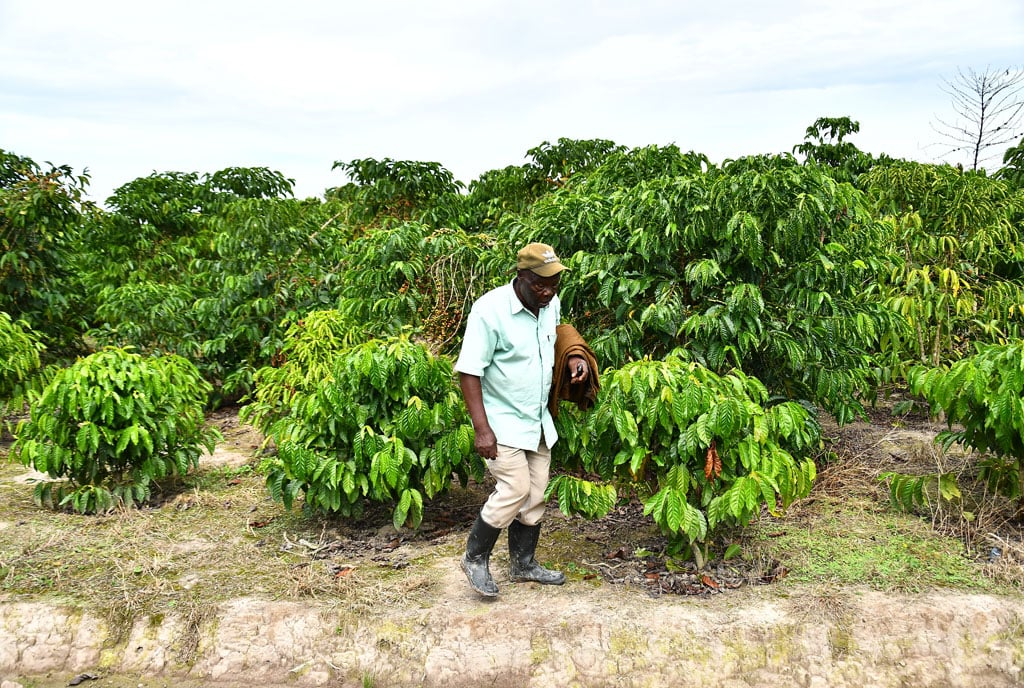Prime
Inside fight over coffee, milk

A man sorts coffee
What you need to know:
- The National Planning Authority gobbled up the National Population Council and the National Physical Planning Board while remaining in situ at the Finance ministry.
Discussions between President Museveni and lawmakers over the rationalisation of government agencies and public expenditure (Rapex) continued yesterday with both the Uganda Coffee Development Authority (UCDA) and the Diary Development Authority (DDA) still in sharp focus.
Following mobilisation efforts from the Parliament committees on Finance, National Economy, and Agriculture, the two government agencies increasingly look like they will live to die another day. In a bid to save more than Shs1 trillion annually spent on public expenditure, the Executive branch of government initially tabled 38 Bills to repeal and amend provisions in the law to enforce the Rapex.
The legislative branch of government was quick in raising a red flag that at the time spared 16 government agencies, including UCDA and DDA.
After President Museveni played hardball, the number now appears to have settled down to two. This, we understand, means the fate of Uganda National Roads Authority (Unra), National Forestry Authority (NFA), Uganda Road Fund (URF), Cotton Development Organisation (CDO) and the Uganda Microfinance Regulatory Authority (Umra) appears to be decided. As indeed is that of National Agricultural Advisory Services (Naads) and Public Enterprises and Divestiture (PED).
The National Coffee (Amendment) Bill, 2024, which seeks to mainstream the functions of UCDA into the Ministry of Agriculture, Animal Industry and Fisheries (MAAIF) continues to be a major bone of contention.
"We are saying that let the Bill wait on condition that the Ministry of Agriculture is ready to take it on a later date and this date being three years from now," Mr Enos Asiimwe, a member of the House Finance Committee, told Saturday Monitor this past week.
MAAIF lampooned
Whereas Ms Hope Grania Nakazibwe of the parliamentary Committee on Agriculture confirmed that a decision to collapse UCDA into MAAIF has been stayed for three years, the Buganda Parliamentary Caucus expressed its misgivings about this action.
"We will not support any law or any Bill that seeks to transfer UCDA or the coffee sector to the Ministry of Agriculture which has obvious challenges," Mr Muwanga Kivumbi, the Butamabala County lawmaker who chairs the Buganda Parliamentary Caucus, said on Thursday.
The caucus also described any move to collapse UCDA into MAAIF as “not well thought through”, adding that such a move “is likely to have negative consequences on the coffee sector and reverse the positive achievements registered so far."
Buganda Kingdom’s top brass has earmarked coffee as a crop that will empower its subjects, and the Kivumbi-led caucus opines that this cannot see the light of day if UCDA is handed back to a ministry that “is sick…bedridden…[and] in ICU.”
The caucus also reckons that once UCDA is swallowed up by MAAIF the former’s workers will be demoralised, gravely impacting the coffee sub-sector that earned government Shs82.25 billion between July 2023 and June 2024.
While, by press time, we had not established the action points from Mr Museveni’s latest interface with a section of lawmakers over the Rapex, Mr Kivumbi has made clear that nothing will make them relent.
“Even if the caucus takes a contrary position, we will still meet on the floor of Parliament and exercise our duty. Empowered by the views of our people, we shall do the needful,” Mr Kivumbi said on Thursday.
The Buganda Parliamentary Caucus intends to commence a consultation tour, sweeping through all districts of Buganda Sub-region in six days starting Tuesday. This will start in Butambala, head to Mityana (Wednesday), Luweero (Thursday), Kyagwe (Friday), Buddu (Saturday), and climax in the Kampala Metropolitan Area.
Afterwards, the caucus intends to convene a meeting in Busiro with high-level stakeholders. A breakfast meeting will then precede a coffee platform through which other lawmakers will be briefed about views collected by the caucus.
Rapex hits
In July, the Public Service ministry confirmed that the Rapex had resulted in nearly 20 government ministries being mainstreamed into the civil service. The Uganda Warehouse Receipts System Authority was for instance subsumed into the Ministry of Trade, Industry and Cooperatives. Uganda Free Zones Authority and the National Physical Planning Board were merged and sent back to the National Planning Authority (NPA) under the Finance ministry. The National Identification Registration Authority (Nira) took on the registration function from the Uganda Registration Services Bureau (URSB). Nira also assumed another registration function from the National Citizenship and Immigration Control.
Elsewhere, the National Planning Authority gobbled up the National Population Council and the National Physical Planning Board while remaining in situ at the Finance ministry. The Uganda National Meteorological Authority (UNMA) morphed into a department under the Ministry of Water and Environment as Uganda Trypanosomiasis Control Council (UTCC) and the Agricultural Chemicals Board (ACB) were collapsed into MAAIF.
There were also changes in the Ministry of Education and Sports, with the Higher Education Students Financing Board (HESFB) becoming a secretariat. The National Library of Uganda and Uganda National Commission for Unesco also became part of the ministry’s structure.
UCDA House report
A report by the House Committee on Agriculture tabled on April 19 outrightly rejected any plans to mainstream UCDA into the civil service, arguing that such a move “will negatively affect the achievements Uganda has attained in quality coffee production and coffee export and access to international markets thus stunting economic growth and development”.
“Uganda’s coffee processing engineers are currently deployed to monitor quality compliance of 560 primary processors, 22 washing stations, 23 roasters, 704 buying stores and 37 export grading stores,” the report further read, adding, “The committee observed that UCDA is responsible for championing the implementation of the coffee roadmap aimed at increasing coffee export volumes from 3.5 million 60kg bags in Financial Year 2015/2016 to 20 million 60kg bags by 2030.”
The Buganda Parliamentary Caucus said in a statement on Thursday that “the UCDA market analysts are highly trained, specialised and experienced to monitor the global market dynamics. This expertise is not available in the Ministry of Agriculture.”
The lawmakers also further noted that Uganda risks losing the KENAS certification and hundreds more if the National Coffee (Amendment) Bill, 2024 is repealed.




